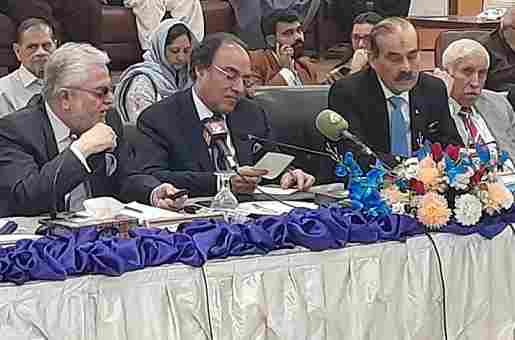Karachi, July 30, 2024 – Pakistan’s Finance Minister Muhammad Aurangzeb expressed concern over the heavy tax burden on salaried individuals and businesspersons during a meeting with the business community at the Karachi Chamber of Commerce and Industry (KCCI) on Tuesday.
He highlighted the necessity of expanding the tax net to include currently untaxed sectors like retail, agriculture, and real estate.
Aurangzeb acknowledged the recent tax hikes for the salaried class and business community as a short-term measure, stating, “We raised taxes for the business community and salaried class this year but we cannot do it again and again as they all are excessively overburdened.” He emphasized the need to bring untaxed sectors into the economy to reduce the load on existing taxpayers.
He commended the Chief Ministers for their willingness to legislate taxation for the agricultural sector, a provincial matter. “We are at the end of the road as we cannot continue to raise taxes for the business community and salaried class, hence, we have to bring the untaxed sectors into the economy and ensure effective enforcement of taxation laws,” Aurangzeb added.
Addressing the structural issues within the economy, the Finance Minister stressed the importance of achieving macroeconomic stability for sustainable growth. “We can only go for growth when we have enough fiscal space which should be export-led,” he said, urging the business community, exporters, and value-added sectors to contribute to this goal.
Federal Minister for Ports & Shipping Qaiser Ahmed Sheikh, Minister of State for Finance, Revenue & Power Ali Pervez Malik, and other notable figures attended the meeting. Aurangzeb praised the State Bank’s decision to cut interest rates by 1 percent, describing it as a step in the right direction. He assured the business community that the government was aware of their challenges, including high taxes and energy tariffs.
The Finance Minister also set ambitious targets for agricultural and IT exports, urging the business community to achieve US$10 billion in agricultural exports and US$5 billion in IT exports.
Aurangzeb revealed that tax refunds totaling Rs51 billion were released to industries on July 1, 2024. He emphasized the government’s commitment to timely tax refunds, stating, “The government will not hold refunds for 8 to 10 months but these will be released immediately after determination.”
He clarified misconceptions about free-of-cost facilities provided to Ministers, asserting, “I don’t take a salary and I along with all the Ministers present at KCCI today pay our bills from our own pockets.”
Minister of State for Finance, Revenue, and Power Ali Pervez Malik highlighted the government’s efforts to attain macroeconomic stability, which have resulted in currency stability, improved foreign exchange availability, and better stock market performance.
Chairman BMG Zubair Motiwala raised concerns about SRO350 and suggested consulting the business community and tax experts before implementing new taxation measures. He also advocated for retaining the Final Tax Regime (FTR) for exporters to maintain the competitiveness of Pakistan’s export sector.
President KCCI Iftikhar Ahmed Sheikh urged the federal government to address the core issues highlighted by KCCI, emphasizing their impact on businesses and the economy. “We are constantly requesting the government to rectify these issues purely in the larger interest of the country,” he said, expressing optimism that the Finance Minister’s experience would help steer the country out of its economic crises.
